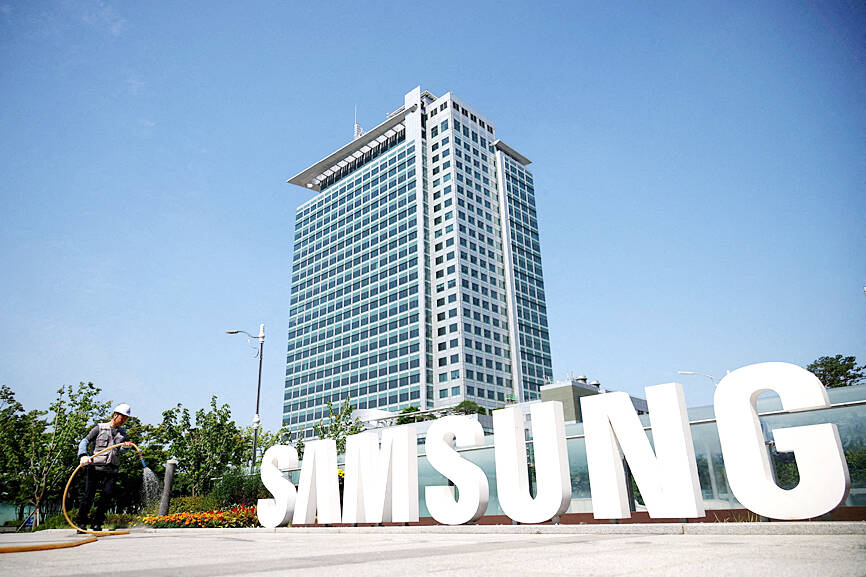US President Joe Biden’s administration plans to announce next week that it is awarding more than US$6 billion to South Korea’s Samsung Electronics Co to expand its chip output in Taylor, Texas, as it seeks to ramp up chipmaking in the US, two people familiar with the matter said.
The subsidy, which is to be unveiled by US Secretary of Commerce Gina Raimondo, would go toward the construction of four facilities in Taylor, including one US$17 billion chipmaking plant that Samsung announced in 2021, another factory, an advanced packaging facility and a research and development center, one of the sources said.
It would also include an investment in another undisclosed location, the source said, adding that Samsung would more than double its US investment to more than US$44 billion as part of the deal.

Photo: Reuters
The US Department of Commerce and Samsung declined to comment on the matter.
One of the sources said it would be the third-largest subsidy of the program, just behind Taiwan Semiconductor Manufacturing Co (TSMC, 台積電), which was awarded US$6.6 billion on Monday and agreed to expand its investment by US$25 billion to US$65 billion, and to add a third Arizona factory by 2030.
The announcement would cap off a string of major CHIPS and Science Act grants in quick succession as the US seeks to expand domestic chip production and lure away capital that might have been used to build plants in China and the region.
The US’ share of global semiconductor manufacturing capacity fell from 37 percent in 1990 to 12 percent in 2020, the Semiconductor Industry Association has said.
The US Congress in 2022 passed the CHIPS Act to boost domestic semiconductor output with US$52.7 billion in research and manufacturing subsidies. Lawmakers also approved US$75 billion in government loan authority, but one of the sources said Samsung does not plan to take any loans.
Biden would not attend the event, the two sources said.
He faces a tough fight to win a second term in November against former US president Donald Trump.
Texas Governor Greg Abbott, a Republican, was invited to attend, one of the sources added.
While TSMC and Intel Corp, which was awarded US$8.5 billion to expand its US chip output last month, are to expand production in the key swing state of Arizona, Samsung’s expansion in reliably Republican Texas is seen as less likely to help Biden during the election.

Semiconductor business between Taiwan and the US is a “win-win” model for both sides given the high level of complementarity, the government said yesterday responding to tariff threats from US President Donald Trump. Home to the world’s largest contract chipmaker, Taiwan Semiconductor Manufacturing Co (TSMC, 台積電), Taiwan is a key link in the global technology supply chain for companies such as Apple Inc and Nvidia Corp. Trump said on Monday he plans to impose tariffs on imported chips, pharmaceuticals and steel in an effort to get the producers to make them in the US. “Taiwan and the US semiconductor and other technology industries

SMALL AND EFFICIENT: The Chinese AI app’s initial success has spurred worries in the US that its tech giants’ massive AI spending needs re-evaluation, a market strategist said Chinese artificial intelligence (AI) start-up DeepSeek’s (深度求索) eponymous AI assistant rocketed to the top of Apple Inc’s iPhone download charts, stirring doubts in Silicon Valley about the strength of the US’ technological dominance. The app’s underlying AI model is widely seen as competitive with OpenAI and Meta Platforms Inc’s latest. Its claim that it cost much less to train and develop triggered share moves across Asia’s supply chain. Chinese tech firms linked to DeepSeek, such as Iflytek Co (科大訊飛), surged yesterday, while chipmaking tool makers like Advantest Corp slumped on the potential threat to demand for Nvidia Corp’s AI accelerators. US stock

The US Federal Reserve is expected to announce a pause in rate cuts on Wednesday, as policymakers look to continue tackling inflation under close and vocal scrutiny from US President Donald Trump. The Fed cut its key lending rate by a full percentage point in the final four months of last year and indicated it would move more cautiously going forward amid an uptick in inflation away from its long-term target of 2 percent. “I think they will do nothing, and I think they should do nothing,” Federal Reserve Bank of St Louis former president Jim Bullard said. “I think the

‘LASER-FOCUSED’: Trump pledged tariffs on specific sectors, including semiconductors, pharmaceuticals, steel, copper and aluminum, and perhaps even cars US President Donald Trump said he wants to enact across-the-board tariffs that are “much bigger” than 2.5 percent, the latest in a string of signals that he is preparing widespread levies to reshape US supply chains. “I have it in my mind what it’s going to be but I won’t be setting it yet, but it’ll be enough to protect our country,” Trump told reporters on Monday night. Asked about a report that incoming US Secretary of the Treasury Scott Bessent favored starting with a global rate of 2.5 percent, Trump said he did not think Bessent supported that and would not